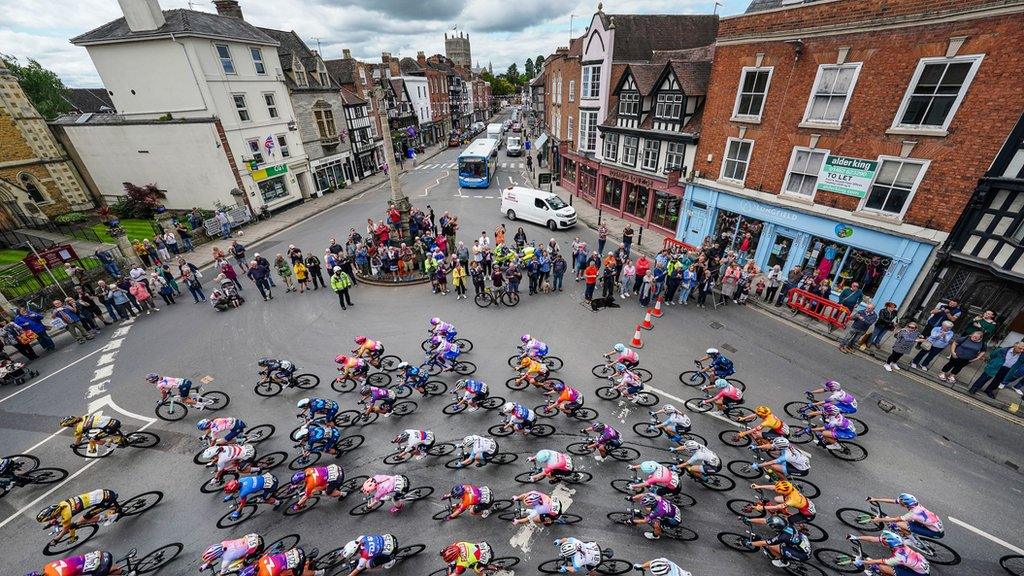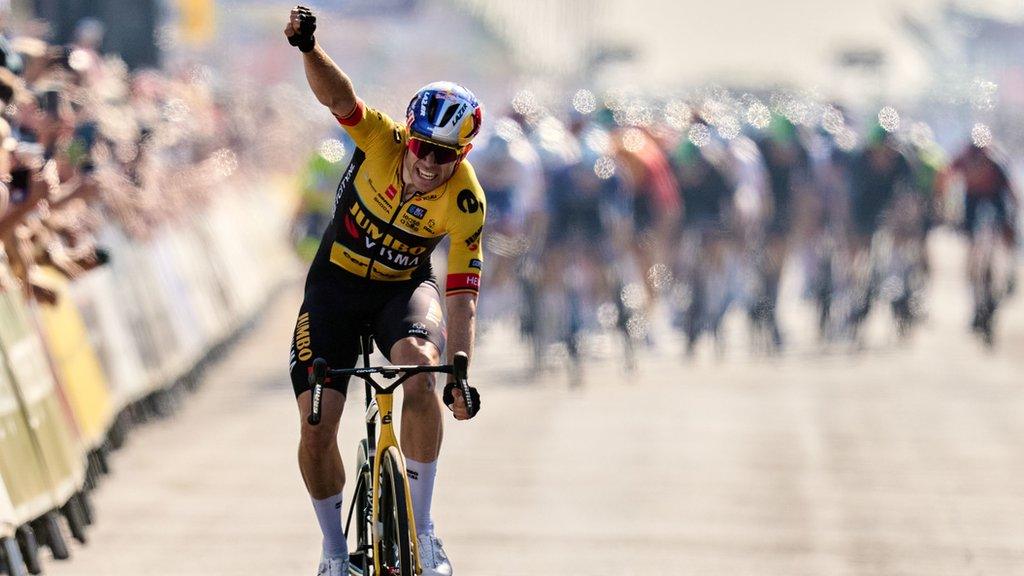British Cycling take on organising Tour of Britain races for men and women
- Published

The Women's Tour was cancelled last year
British Cycling says it faces a "race against the clock" to hold the Women's Tour, after collaboration with the previous organiser became "untenable".
The governing body will run the men's Tour of Britain and Women's Tour after Sweetspot, which owed many thousands of pounds, was liquidated in January., external
The women's race could have "duration compromises", British Cycling chief executive Jon Dutton told BBC Sport.
However, he added: "It's an opportunity to build momentum and credibility."
Holding races in the UK has often been challenging for organisers, which can include high costs for policing. Other races on the continent, such as the Tour de France, often do not have to bear such costs.
"We saw it as an opportunity when working through the untenable situation we found ourselves in," Dutton said, referring to the revelation that Sweetspot owed large amounts of money in race fees.
The women's race, previously known solely as the Women's Tour, is a top-level World Tour event in elite road cycling and is scheduled to take place from 4-9 June this year. It was not held in 2023 following Sweetspot's unsuccessful attempt to crowdfund it.
"We're a not-for-profit organisation - any money we bring in is invested back into cycling, and that is why the debt outstanding hurts so hard, because that money was ringfenced for community cycling," said Dutton, who took up his role as British Cycling chief last April.
"The men's and women's Tour of Britain are multi-million pound races, and things that happen on the highway are more costly than ever.
"We're working on [the traditional] eight-stage race for men, but at this point in time we do not think it will be six-stage race for women.
"We're doing everything we can to make sure this is a quality racing experience, not just on the number of stages - it's about terrain, geography, topography."
Why are these races important?
Both races have prestige in cycling and have been won by some of the sport's biggest names - despite the men's race being a second-tier event on the ProSeries calendar, held in September.
Last year Belgian one-day race specialist Wout van Aert won for Jumbo-Visma.
Despite problems funding the events - which can't be ticketed as they take place on public roads - thousands of people line the course, especially in towns and cities at the start and finishes of routes.
Many believe the existence of the races prop up the smaller-budget teams who compete in the UK, and who would not survive without them.
This year marks a decade since cycling's biggest stage race, the Tour de France, held its Grand Depart in Yorkshire, spawning the Tour de Yorkshire stage race, which is no longer held.
The Women's Tour was seen as a doubly important after becoming part of a handful of races to break new ground in the sport in 2018 when it equalled the prize money to the men's race - around £80,000 for the winner.
"We're very minded of that prize money perspective, we don't want to take a backwards step in terms of quality, but obviously have to be proportionate. We have a a high level of determination to succeed," said Dutton.
Lizzie Deignan, rider for Lidl-Trek and twice winner of the Women's Tour had been frustrated by the lack of support for the women's Tour last year, but said: "I'm really happy to see British Cycling investing to try and make sure these two important UK stage races happen in 2024 and for years to come, and I hope everyone can get behind this."

Wout van Aert won last year's Tour of Britain
What about the future?
The Tour of Britain returned in 2004 following a hiatus after the race's heyday as the Milk Race in the 1980s and '90s. Sweetspot ran the Women's Tour as its own brand and received many plaudits for its progressive approach.
But following the cancellation of last year's race and the subsequent revoking of the licence of the men's Tour by British Cycling in November, the company went into liquidation owing hundreds of thousands of pounds to creditors.
Dutton, along with new head of events Jonathan Day, unveiled a five-year plan to incorporate all of cycling's most popular disciplines, including road, track, BMX, cyclocross and mountain biking, with a "positive social and community impact at heart, while reaching new audiences".
But British Cycling does not expect to be able to make money from both of the UK's flagship stage races - alongside the separately run Ride London - seeing 2024 as an "investment".
Dutton added: "We're conscious of the risk. Growth won't happen overnight. We have a level of comfort, but the elastic will not stretch too far before it breaks.
"Yes money's tight in the public sector but we haven't had doors closed in our face. We are excited. The focus of British Cycling is to bring the joy of cycling to everyone. We know 45% of the population have ridden a bike in past 12 months, which is an astonishing figure.
"We have sense of determination to make sure we do something quite special with it."